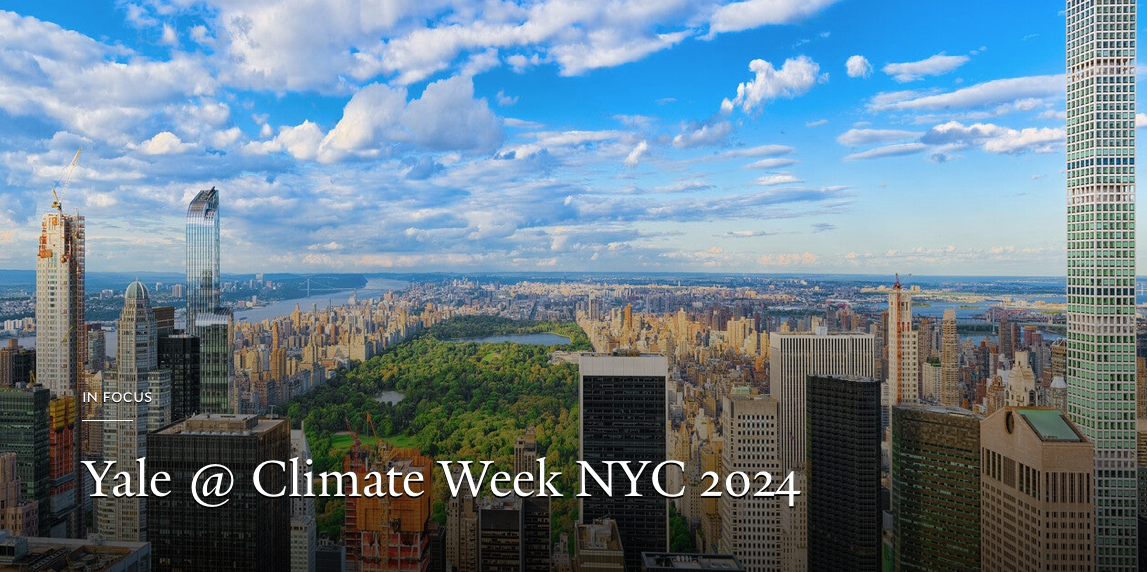Yale Climate Summit in New York
Climate Week in NYC a Turning Point for Yale
In late September, Yale hosted its first-ever Climate Summit, in conjunction with the United Nations Climate Week in New York City, to showcase the University’s Planetary Solutions Project. The four-day summit drew several hundred Yale alumni environmental leaders, including Yale Blue Green board members, who reported on progress and explored future directions to meet the climate crisis. Unable to join in person from California, I attended the opening sessions virtually and was inspired by the commitment Yale is making to address the existential challenge we face. What a remarkable group of environmental leaders our University has assembled!

Provost Scott Strobel explained that Yale created Planetary Solutions in 2020 to to “seek interdisciplinary solutions to global environmental problems,” building on a history of climate and environmental work that started with the founding of the Yale Forestry School, now the Yale School of the Environment in 1900. And he applauded the appointment of Professor of Green Engineering Julie Zimmerman as Vice Provost in 2023 to strengthen the interdisciplinary effort.
Yale’s new president, Maurie McInnis, thanked the Planetary Solutions team for deepening Yale’s commitment to reducing its carbon footprint, seen in the current geothermal initiative as a way to achieve Net Zero Energy by 2035. “Yale must solve and demonstrate solutions,” she said, adding that “Yale has to be a test bed for knowledge into action and grow the next generation of environmental leaders.” Notably, President McInnis devoted her first letter to the alumni in September--“Accelerating Planetary Solutions for a Better World”—to Yale’s critical role in addressing the climate crisis, signaling she is committed to Yale leading the way.
Indy Burke, dean of the Yale School of the Environment and a biogeochemist, said she had to “start with the bad news,” citing the impact of climate change that is more evident by the day, with the two hottest days in record in July, further Artic ice melt, wildfires and floods producing global turmoil. For Indy, the “good news” is Yale’s plan to “create solutions to planetary problems at scale.” With Julie Zimmerman holding a joint appointment in YSE, Planetary Solutions is promoting interdisciplinary research on a range of issues including green engineering, natural and business solutions, urban resilience, climate justice, climate change law, effective climate communication, climate change law and policy and carbon pricing. Most importantly, she said, Yale must “educate the next generation of climate leaders.”
Dan Esty, who holds appointments in YSE and Yale Law School, just returned to the University after two years working with the World Trade Organization to help develop a framework for a sustainable global trade system. Referring to Yale’s involvement at COP28, where there were 100,000 attendees, he noted the result of the global “stock take” after 30 years of international effort was: “emissions still rising.” Asking the essential question “what can we do differently?”, he convened a panel of remarkable Yale leaders.
“Catalyzing Climate Change Leadership to Drive Planetary Solutions in the United States and Around the World” featured Rhode Island Senator Sheldon Whitehouse, California Attorney General Rob Bonta, and Environmental Defense Fund President Fred Krupp. Whitehouse argued that given the accelerating scale of the climate crisis, we are now in a “price carbon or fail” moment, and he cited the prospect of a meltdown of the property insurance-mortgage-housing value market beginning in Florida. Rob Bonta observed that “Mother Nature and our own eyes are telling us about the existential threat we face,” and he explained the multi-billion dollar lawsuit he filed just the previous day against Exxon Mobile about the disinformation campaign the corporation waged for decades based on the “myth of plastic recycling” they knew was not viable and has led to our planet drowning in plastic waste. Fred Krupp expressed gratitude for his 50-year relationship with Yale and argued we must move from thought to action, with priorities, including to stop burning rain forests that accounts for 20% of C02 going into atmosphere and stopping methane emissions that are 80 times as potent as C02.
Former Secretary of State John Kerry provided perspective on “Leadership in a Complex World” in a discussion with NY Times climate journalist Lisa Friedman. Reflecting on “the stakes for this election,” Kerry observed we face an “inflection point on climate as an existential threat,” but we have “spectacular opportunity.” Invoking John Doerr’s book, Speed and Scale, he observed that we know the climate challenge, and we also know the solutions to the problems. Citing the US experience in World War II in becoming the arsenal of democracy, he urged Julie Zimmerman and the Planetary Solutions team to move with alacrity on a big scale. Now all we need is better politics, he said, and the kind of leadership Yale can provide.
Paul Chapman ’70, Yale Blue Green Board






